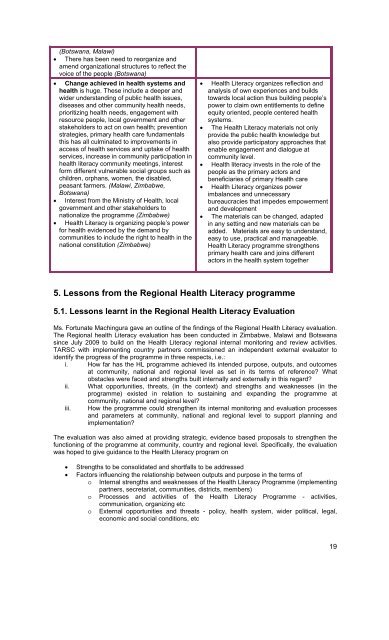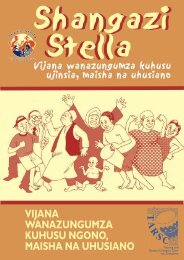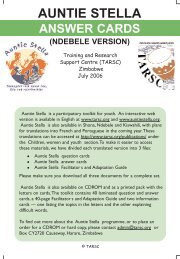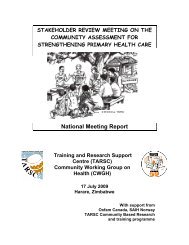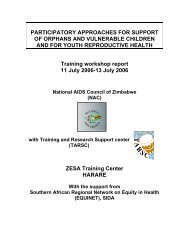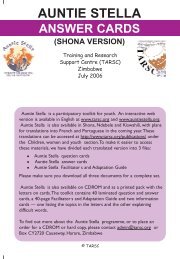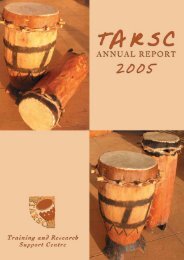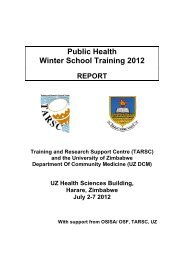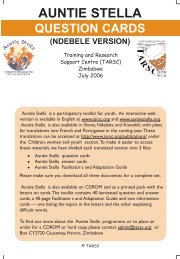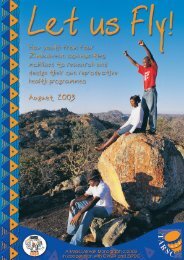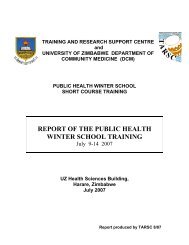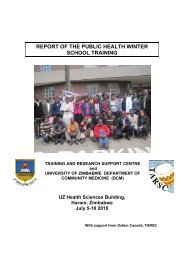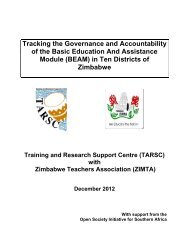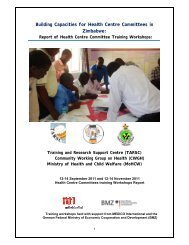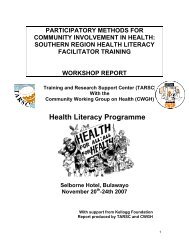HLregional meeting09.pdf - Training and Research Support Centre
HLregional meeting09.pdf - Training and Research Support Centre
HLregional meeting09.pdf - Training and Research Support Centre
You also want an ePaper? Increase the reach of your titles
YUMPU automatically turns print PDFs into web optimized ePapers that Google loves.
(Botswana, Malawi)<br />
• There has been need to reorganize <strong>and</strong><br />
amend organizational structures to reflect the<br />
voice of the people (Botswana)<br />
• Change achieved in health systems <strong>and</strong><br />
health is huge. These include a deeper <strong>and</strong><br />
wider underst<strong>and</strong>ing of public health issues,<br />
diseases <strong>and</strong> other community health needs,<br />
prioritizing health needs, engagement with<br />
resource people, local government <strong>and</strong> other<br />
stakeholders to act on own health; prevention<br />
strategies, primary health care fundamentals<br />
this has all culminated to improvements in<br />
access of health services <strong>and</strong> uptake of health<br />
services, increase in community participation in<br />
health literacy community meetings, interest<br />
form different vulnerable social groups such as<br />
children, orphans, women, the disabled,<br />
peasant farmers. (Malawi, Zimbabwe,<br />
Botswana)<br />
• Interest from the Ministry of Health, local<br />
government <strong>and</strong> other stakeholders to<br />
nationalize the programme (Zimbabwe)<br />
• Health Literacy is organizing people’s power<br />
for health evidenced by the dem<strong>and</strong> by<br />
communities to include the right to health in the<br />
national constitution (Zimbabwe)<br />
• Health Literacy organizes reflection <strong>and</strong><br />
analysis of own experiences <strong>and</strong> builds<br />
towards local action thus building people’s<br />
power to claim own entitlements to define<br />
equity oriented, people centered health<br />
systems.<br />
• The Health Literacy materials not only<br />
provide the public health knowledge but<br />
also provide participatory approaches that<br />
enable engagement <strong>and</strong> dialogue at<br />
community level.<br />
• Health literacy invests in the role of the<br />
people as the primary actors <strong>and</strong><br />
beneficiaries of primary Health care<br />
• Health Literacy organizes power<br />
imbalances <strong>and</strong> unnecessary<br />
bureaucracies that impedes empowerment<br />
<strong>and</strong> development<br />
• The materials can be changed, adapted<br />
in any setting <strong>and</strong> new materials can be<br />
added. Materials are easy to underst<strong>and</strong>,<br />
easy to use, practical <strong>and</strong> manageable.<br />
Health Literacy programme strengthens<br />
primary health care <strong>and</strong> joins different<br />
actors in the health system together<br />
5. Lessons from the Regional Health Literacy programme<br />
5.1. Lessons learnt in the Regional Health Literacy Evaluation<br />
Ms. Fortunate Machingura gave an outline of the findings of the Regional Health Literacy evaluation.<br />
The Regional health Literacy evaluation has been conducted in Zimbabwe, Malawi <strong>and</strong> Botswana<br />
since July 2009 to build on the Health Literacy regional internal monitoring <strong>and</strong> review activities.<br />
TARSC with implementing country partners commissioned an independent external evaluator to<br />
identify the progress of the programme in three respects, i.e.:<br />
i. How far has the HL programme achieved its intended purpose, outputs, <strong>and</strong> outcomes<br />
at community, national <strong>and</strong> regional level as set in its terms of reference? What<br />
obstacles were faced <strong>and</strong> strengths built internally <strong>and</strong> externally in this regard?<br />
ii. What opportunities, threats, (in the context) <strong>and</strong> strengths <strong>and</strong> weaknesses (in the<br />
programme) existed in relation to sustaining <strong>and</strong> exp<strong>and</strong>ing the programme at<br />
community, national <strong>and</strong> regional level?<br />
iii. How the programme could strengthen its internal monitoring <strong>and</strong> evaluation processes<br />
<strong>and</strong> parameters at community, national <strong>and</strong> regional level to support planning <strong>and</strong><br />
implementation?<br />
The evaluation was also aimed at providing strategic, evidence based proposals to strengthen the<br />
functioning of the programme at community, country <strong>and</strong> regional level. Specifically, the evaluation<br />
was hoped to give guidance to the Health Literacy program on<br />
• Strengths to be consolidated <strong>and</strong> shortfalls to be addressed<br />
• Factors influencing the relationship between outputs <strong>and</strong> purpose in the terms of<br />
o Internal strengths <strong>and</strong> weaknesses of the Health Literacy Programme (implementing<br />
partners, secretariat, communities, districts, members)<br />
o Processes <strong>and</strong> activities of the Health Literacy Programme - activities,<br />
communication, organizing etc<br />
o External opportunities <strong>and</strong> threats - policy, health system, wider political, legal,<br />
economic <strong>and</strong> social conditions, etc<br />
19


